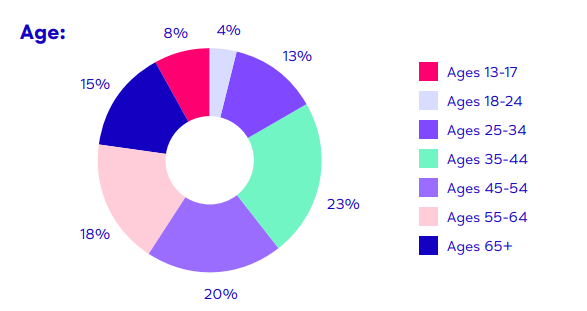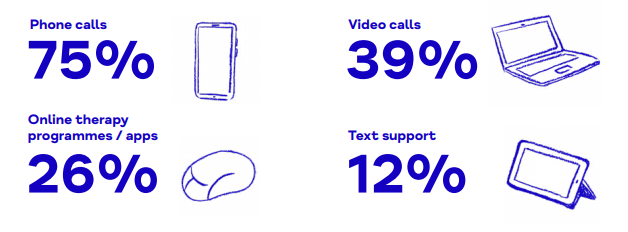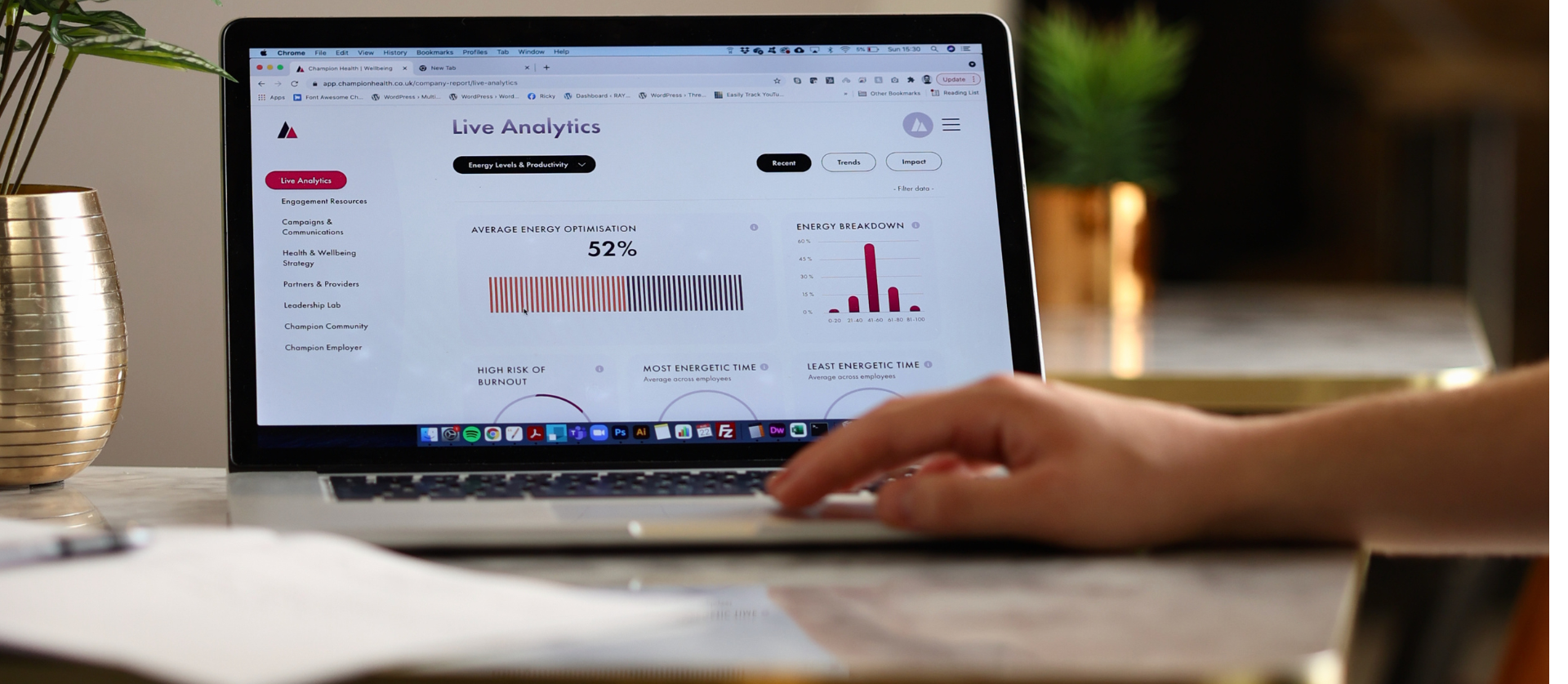Mind’s “Trying to connect: the importance of choice in remote mental health services” report is out now.
The sizeable 36-page report outlines the benefits provided by remote mental health support and the pitfalls that must be avoided.
While you may not have time to digest the full report, you’re probably still interested in the key findings. That’s why we’ve simplified the report for you.
Depending on how much time you have, pick one of these options:
- If you’re time-limited, we’ve summarised the 5 take-key home points in a 1-minute speedread
- If you have more time, we’ve fleshed out those points a little more, in a 5-minute blog
- And for those who love their research, you can find a link to the full report
Five findings (1-minute read)
Only got 1 minute? Here are the five key points from the report.
- It’s all about choice: A one-size-fits-all approach to wellbeing will not work
- There’s a place for digital wellbeing services: Over 40% of people felt that online or phone-based therapy improved their mental health.
- But, they must be accessible: Difficulty using the online platforms led to appointments being cancelled.
- Confidentiality is key: Over 30% of people worried about confidentiality often or all the time.
- Prioritise personalisation: The generic nature of the programmes reduced their effectiveness.
What Mind’s report told us about remote mental health services (5-minute read)
For those of you who’ve got a little longer, here’s a five-minute read, which outlines each of those points in more detail.
How effective can digital wellbeing services really be?
As reliance on online and phone-based wellbeing support grows, and access to digital wellbeing services increases, this is a question to be considered.
Digital wellbeing services offer the opportunity to slash waiting times and increase accessibility to help and support, but they must be implemented and run correctly.
Over the past few years, we’ve seen more and more online websites and apps offering wellbeing support for mental health and the events of the past year have dramatically increased the need for online wellbeing services.
The COVID-19 pandemic led to a significant increase in the quantity of remote mental health therapy delivered; face-to-face meetings were restricted to slow down the spread of the virus.
But how effective was this switch to online mental health support, and what does this mean for other digital wellbeing services?
Mind conducted a survey to investigate people’s experiences of being offered and / or using support for their mental health from the NHS by phone or online.
Who was included in the study?
The study included 1914 people aged 13 or over.
Of the participants, 77% identified as female, 21% identified as male and under 2% identified as non-binary. Over 2% identified as trans or transgender.Only 8% of the participants identified as being from Minority Ethnic communities, while 89% identified as white.
Nearly half of the participants (47%) had a long-term health problem or learning difference and 89% had a personal experience of a mental health problem.

By the authors’ own admission, the sample was not representative of the general public, and people who identified as male and people from Minority Ethnic communities were underrepresented in the study.
What type of support did people receive?
Of those who had been offered mental health support by phone or online, 80% took up this offer, and 14% did not take up the offer (others preferred not to say).

What were the main findings from the survey?
The results of the survey shed a light on both positive and negative aspects of therapy offered online or over the phone.
The 5 main findings are outlined here. We have also outlined what these findings tell us about digital wellbeing solutions.
1. It’s all about choice
In a report that highlighted the importance of choice in remote mental health services, this was the overriding take-home message. For some, remote access to support worked and was preferable to face to face, while for others this wasn’t the case.
This shows that, where wellbeing is concerned, a one-size-fits-all approach will not work and in some cases may do more harm than good. With digital wellbeing solutions, flexibility and inclusivity are key. People need to be given a range of services to choose from.
And it must be a genuine choice. If someone needs therapy urgently, then a choice between quick access to remote therapy or a long wait for face-to-face therapy is not really a choice at all.
2. There’s a place for digital wellbeing services
The results of the study showed that digital wellbeing solutions can certainly be effective.
Two thirds of those who took up the offer of mental health support over the phone felt their mental health improved after they accessed the support.
Use of digital support programmes also decreased waiting times, with 30% of people feeling that getting support by phone, video call or online meant that they could access support more quickly.
Of those people not offered access to online therapy, 61% would have liked to be given this choice.
These results highlight that there is a place for digital wellbeing services. Some people even preferred online or phone-based therapy to face-to-face therapy.
3. Digital wellbeing services must be accessible
Wellbeing solutions need to be as accessible as possible for as many people as possible. If this is not the case, they will be less effective.
Some participants in the study reported difficulty using the online platforms, which led to appointments being cancelled or abandoned.
This was more than an inconvenience; for people accessing mental health support, this reduced time with a health professional and impacted their therapeutic experience.
4. Confidentiality is key
Concerns about confidentiality was one of the main issues that people had with online or phone-based mental health services, with 34% of people worrying about confidentiality often or all the time.
This was often because people felt that remote appointments blurred the normal boundaries that define a mental health appointment. This led to a lack of confidence that the same rules of confidentiality that applied to face-to-face therapy applied for online or phone-based services.
Lack of privacy was also a major concern. Many found it difficult to find a place at home where they could talk freely without fear of being overheard. This affected people’s openness in conversations and limited the range of issues that they were willing to share with a therapist.
For some, home is not even a safe place, as shown by the increase in domestic violence during lockdown.
5. Prioritise personalisation
Some people reported that the programmes were too generic to provide them with the mental health support that they needed.
From out-dated references to accents that some people found unsettling, issues relating to the generic nature of the programmes diminished their effectiveness.
In some cases, this “copy-and-paste” approach even led to mental health symptoms worsening because of the therapy.
The lack of personalisation also made people feel that they were completing the programmes with little support or guidance.
The importance of choice
This report from Mind highlights the importance of choice in accessing wellbeing support; a one-size-fits-all approach to digital health services simply won’t work.
Services must take account of the different challenges people face, and tailor to each of them as much as possible. Failure to do this will result in ineffective support and may even result in the services doing more harm than good.
Choice comes from wellbeing services being flexible, inclusive and accessible, so these features should be front of mind for anyone developing or implementing a digital wellbeing service.
For more information about mental health and wellbeing in the workplace, take a look at this report covering employee wellbeing statistics.





